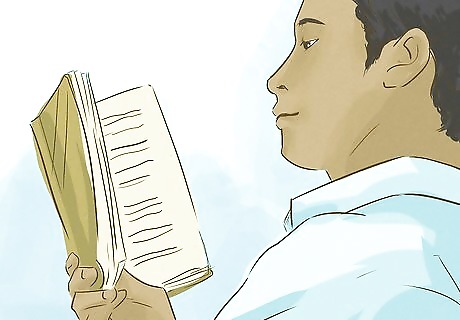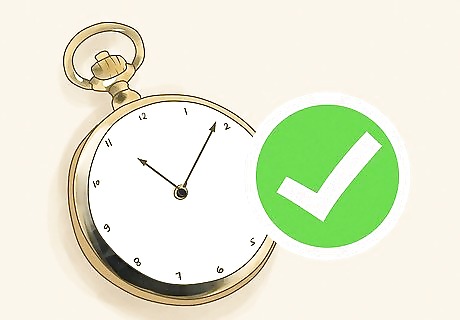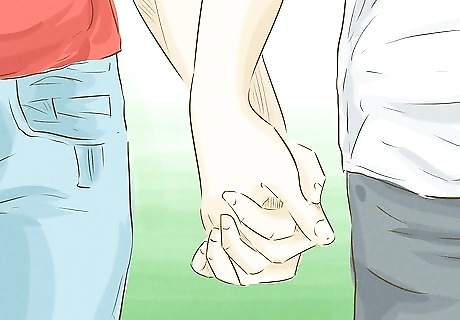
views
Deciding to Tell Your Partner

Consider your motivation. If you are considering telling your partner about your depression, you probably have a reason you want them to know. Think about the reason you want to tell them. Knowing why you want your partner to know can help you figure out what to say and what you need from them. Some questions to consider include: Are you looking for support from your partner? Do you think the relationship will benefit from your partner knowing about your condition? Has your partner been asking questions or noticed something is going on with you?

Determine if your partner can provide support and understanding. Depression and mental illness have a certain stigma in society. This means that many people misunderstand or have preconceived notions about depression. When you decide to tell your partner, you need to decide if they will be understanding and provide the support and positivity you need. Determine if your partner will be understanding when you tell them this new information. Will they be able to handle the fact that you have depression? Will they be understanding, or will they think something is wrong with you or that you need to just get over it? You may want to prepare for negative reactions. Be aware that not all relationships can withstand problems like depression.

Figure out how much you want to share with your partner. Just because you are telling your partner about your depression doesn't mean that you have to tell them every little detail about your life or condition. You get to control what information you tell them. Decide ahead of time how much you want your partner to know about your depression. This may depend on how close you and your partner are and at what stage your relationship is. If you have recently gotten together, you may want to share less details than if you have been together for years. Ask yourself what will make you feel better to have your partner know about you. For example, you may just want them to know that you are depressed, but not that you are on medicine or go to therapy. You may want them to have details about how you feel, or you may share vivid thoughts and feelings you have.

Be mindful of your own needs. Since you are in a committed relationship with your partner, hopefully they will be accepting and supportive of your condition. However, some people may not be understanding of your condition. Alternately, your partner may have difficulties accepting or adapting to this news. To help you through this possible scenario, you should find a support system you can rely on if the talk with your partner doesn't go positively. For example, you may want to talk to your best friend, parent, sibling, or even therapist about your decision to share your depression with your partner. Ask them to help you in case your partner is not supportive. Make sure you protect yourself and your emotions. Though you are suffering from depression, there is nothing wrong with you. Depression is a common and manageable mental illness. Though you may love your partner, you come first. Be prepared to put your emotions and well being first if your partner is not understanding and supportive.
Figuring Out What To Say

Write down things to say ahead of time. Opening up about your depression can be a difficult task. You may find that you feel helpless or hopeless. You may feel that there is nothing that your partner can do for you, or that it may be pointless to tell them. You may feel that you can't mentally or physically tell your partner about your condition. You may be afraid they will stop loving you. This may just be the depression talking. To help with this, you can write down what you want to say to your partner ahead of time. You can make a bulleted list outlining topics you want to cover. You may also consider writing a letter to your partner to read to them if that will be easier. For example, you may write down phrases like, "I have depression" followed by a list of your specific symptoms. You may also write down specifics about how you feel, such as "Sometimes I have trouble getting out of bed" or "I don't feel like interacting with people most of the time."

Practice what you want to say. Explaining your depression to your partner may be a very stressful and difficult thing for you. You may not be able to talk openly or clearly when faced with them. If you think you're going to have trouble telling your partner about your depression, then you may want to practice ahead of time. Try saying the words you want to say to your partner out loud. You may even find it easier to read it from what you've already written down. You may want to practice with a trusted family member or friend who already knows about your depression, or you may want to talk it through with your therapist.

Learn about depression. Before you talk to your partner about your depression, you should learn what you can about it. You should familiarize yourself with the symptoms of depression and how they affect you. This information can help you answer any questions your partner may ask you. Help them understand your situation. You can get together resources for your partner in case they want to read more about depression. This may include reputable websites or books from medical institutions or psychological associations. You may want to do research into any related conditions you may have, like anxiety or panic disorders. You may want to research how other couples who deal with depression manage their relationship. You may consider going to a group therapy meeting to meet other people who have discussed their depression with their partners, or call a hotline for advice.
Having a Constructive Conversation

Choose a good time. When you tell your partner about your depression, you want to make sure to choose the right time. Give yourself plenty of time to explain your situation. Pick a time when both of you are free. Try to do it when you are in a good emotional and mental place. This may not be an option if you are always feeling depressed. Try to pick a day where you feel up to the task of talking about your depression. Pick a good place to tell your partner. Don't do it in a busy restaurant, or in a place where you are surrounded by others. Choose a quiet, private place where you two can talk.

Be honest. When you tell your partner about your depression, you should be honest with them. You and your partner have a relationship and share many aspects of your life. This means you should be able to tell them the truth about how you feel. Help them understand that this isn't the same thing as a bad mood or how they might feel down. Try to be as descriptive and honest about your feelings as you can. This can help your partner understand your situation more.

Communicate your needs. For many, depression means that you don't find the same enjoyment out of things that you used to. Your partner may think that you have been pushing them away or rejecting them because you don't like doing what you used to. You may want to tell your partner that it isn't them that you don't enjoy, but the activity. Explain your symptoms to your partner, such as having trouble getting out of bed, not wanting to eat or overeating, having trouble sleeping, having difficulty concentrating, losing interest in things you used to enjoy, and feeling fatigued. If you and your partner were sexually or romantically intimate, your relationship may have suffered due to your depression. If this is the case, explain this to your partner. You may tell your partner that you'd like to find new activities that you enjoy doing together. Ask your partner to be patient with you. You can tell them that you may find enjoyment in those activities again, but if you don't, you two can find other ways to spend time together. You may want to tell your partner what you do to treat and manage your depression. Explain that there is no quick fix, but these management techniques help put you in a better place.

Let your partner know how to help you. Because of your depression, you may need certain things from your partner. You may need someone to talk to, someone to support you, or someone who can be there when you can't give your all. You probably need patience, love, and understanding. When you tell your partner about your depression, you should let them know what they can do to help you. They are your partner after all, so they care about you and want to help you. For example, you may need your partner to stay at home watching television or playing games with you because you don't feel like leaving the house. Maybe you want to cook dinners together instead of going to a restaurant. You may just need your partner to be a listening ear. You may need your partner to gently encourage you to get out of the house. If you feel like it, you can include your partner in some of your management strategies. For example, if you do yoga or exercise, you can ask them to go on a walk or come to a class with you.

Listen to your partner's response. When your partner responds, you should listen to their words closely and respectfully. Don't interrupt, react emotionally, or take what they say the wrong way. Your partner may need time to process what you have told them verbally, or they may need time alone to process. Respect their response and work together to come to a place that is healthy for both of you. It may be difficult for your partner to learn that someone they love is suffering from a serious illness. Some people may not understand what depression is, and other people may have stereotypes in mind about depression. Keep these things in mind as your partner reacts. If they don't immediately respond with support and understanding, that doesn't mean they won't eventually. If you find yourself getting upset because your partner is upset, take a few deep breaths and remind yourself that everyone is allowed to have their emotions.




















Comments
0 comment